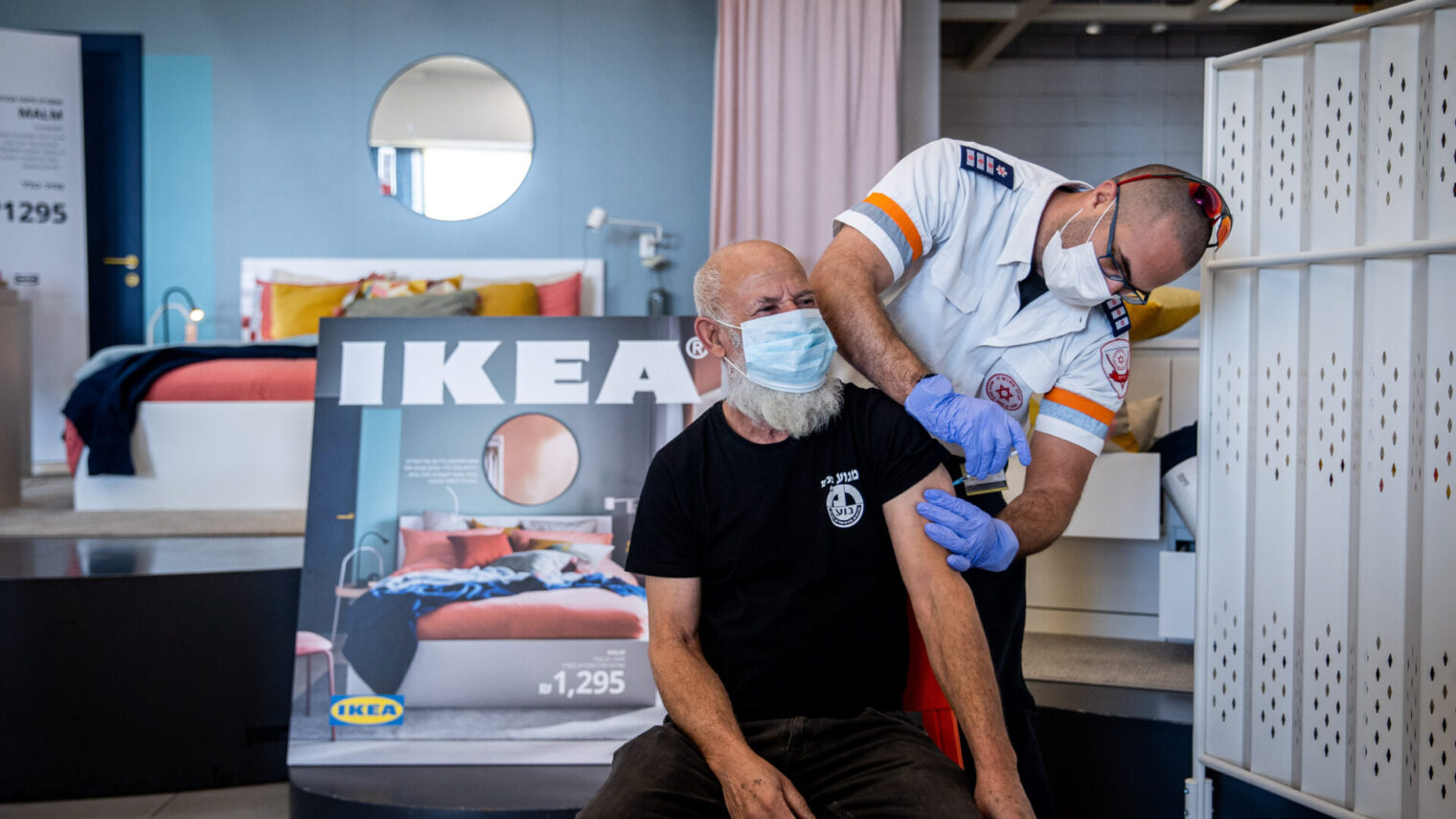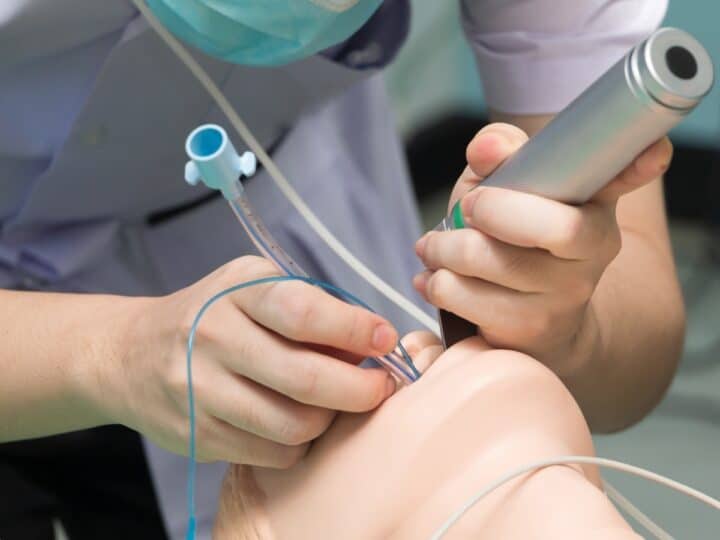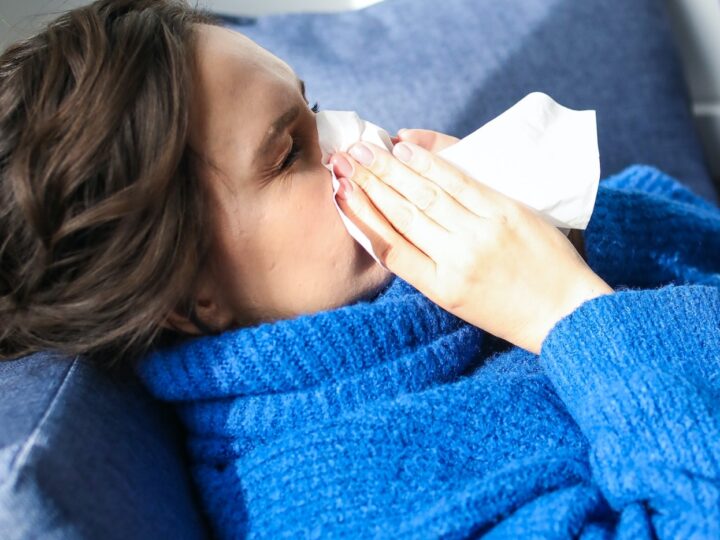The Covid-19 vaccine is one of the most pressing issues of our times, and because it’s so new and we are all being encouraged by governments and health authorities worldwide to take it, everyone has questions.
To help ease minds and fill these gaps of knowledge, we invited two experts, vaccine specialist Dr. Ronald Ellis and virologist Dr. Ella Sklar, to take part in a Zoom webinar with ISRAEL21c Editor Nicky Blackburn to discuss the vaccine, and what it means for us and for the world.
Questions poured in. And because we couldn’t answer all of them during the webinar, our two experts generously agreed to answer the questions in writing.
You can find the questions and answers below. To view the full webinar, please scroll down.
- If everyone wore proper masks, would there be a need to get vaccinated? And if the majority get vaccinated and the rest wore masks, would that suffice?
Regular surgical masks do not give full protection and you can still get infected. It is also not reasonable to assume that people will wear masks all the time. Wearing masks and following social distancing measures can significantly lower transmission. Thus, if the vast majority will get vaccinated and the rest will follow the rules, we will be in a very good shape. If everyone will be vaccinated, we will be in even better shape!
- Does nutrition play a role in the severity of the symptoms?
There is no currently known clear association. Nevertheless, it is reasonable to assume that if you are in a generally good shape, your body will be able to better fight the disease – as well as most other diseases.
- Have any certain groups of people been found to be less affected by the virus?
There have been several studies pointing at different groups. None of these were large enough or convincing enough to reach a scientific consensus. Most studies agree that children typically get less severe disease.
- I would like to know if, as a vaccinated senior, I can hug my grandchildren (14 and younger) and spend time with them indoors with all of us wearing a mask. Can we eat together?
The vaccine does not prevent infection; it prevents disease and hospitalization. Also, it does not provide 100% protection from disease. Thus, it would be best to still be careful as much as possible and postpone hugging those not in your immediate household until the prevalence of virus declines to a much lower level.
- I am vaccinated, but my four-year-old is around other kids in the playground and wears a basic cloth mask. Can she give it to me? Or to non-vaccinated friends that are masked or unmasked? Her school does surveillance testing but not of the kids younger than five!
Yes, she can. As we mentioned in the webinar and above, the vaccine does not prevent infection; rather, it prevents disease and hospitalization. If you wear a mask and follow social distancing measures, you will significantly reduce the risk.
- What changes can a fully vaccinated person make in their private social life? Are they free to be with other fully vaccinated people? Indoors? Unmasked? The CDC says these people do not need to quarantine after being exposed to the virus. Why is that?
Vaccinated individuals have a lower risk of infection and if they get infected, they also produce less virus if they are infected and thus are less likely to infect others. This is one of the reasons behind the CDC recommendation. Another reason might be an incentive for people to get vaccinated. All people unequivocally should continue to wear masks and continue social distancing and person hygiene measures until health authorities are satisfied that the virus has reached a low level of prevalence in the population.
- When do you think we’ll be able to travel again?
It depends on specific government policies and on vaccine uptake in the country for travel; hence, this cannot be predicted. We hope that things will continue to go back to normal over the next year.
- Do you think that the success of the mRNA vaccines is going to change the manufacture of vaccines?
Yes, now that a vaccine using this technology was approved and shown to be safe and effective, we hope and expect that others will follow. Companies have several mRNA vaccines in their pipeline, including for Influenza virus, respiratory syncytial virus, Cytomegalovirus, and Zika virus. These vaccines will follow a routine timeline for clinical trials. Therefore, any such vaccine that will be shown to be safe and effective will take many years for approval to bring it to market.
- What will happen in the cells? Will the mRNA stimulate the cells to “grow” wrong proteins, or DNA in the long term?
The mRNA in the vaccine enters an area in the cell called the cytoplasm where it is translated to produce the coronavirus spike protein. The mRNA itself is degraded after a few hours. It does not enter the cell nucleus where our genetic material, the DNA, resides and thus cannot affect the DNA. Parts of the spike protein that are produced in this cell are presented to the immune system to stimulate the production of antibodies and immune memory to that protein. The produced spike protein itself is degraded and does not persist. Following vaccination, the immune system will be able to respond rapidly and efficiently if the person gets infected. Based on this mechanism of action, there is no reason to think that the cells are affected for the long term.
- Do all the vaccination types being offered contain the mRNA approach and also which contain the genetically manipulated adenovirus from monkeys or aborted embryonic material? Also aluminum and mercury? Many are concerned hearing these statements which need verification or explanation as regards the ingredients and any side effects.
Two vaccines contain RNA. None contain aborted embryonic material, as some anti-vaccine groups are saying. One might contain aluminum, which has been in billions of doses of vaccines over time. One might contain a mercury derivative that has been shown to be inserted, which also has been in over one billion doses of vaccines to date. All ingredients are published, and are confirmed and approved by national regulatory authorities to be safe for human exposure. All such components are justified for being in the vaccine for a reason, e.g. as a preservative or to enhance effectiveness.
- The stimulation of antibodies by mRNA is new. According to the website of Pfizer itself, the vaccination has the label experimental by the FDA. It stimulates the assembling of proteins in the form of antibodies to Covid, but does it also stimulate other proteins? Proteins that are harmful for people? What is already known/ researched?
It does not stimulate production of proteins. The vaccine contains the mRNA that has the information needed to produce only one protein, the SARS-CoV-2 spike protein that stimulates the production of antibodies that prevent Covid-19 infection.
- Can you talk about Moderna and its side effects compared to Pfizer?
The composition and mechanism of action of these two vaccines are generally similar, hence the side effects are similar.
- Could you explain why a virus “wouldn’t want to be deadlier”?
In general, the “purpose” of a virus is to survive. It does not make evolutionary sense for a virus to readily kill its host since deadly viruses cannot spread much. The most persistent viruses are the ones with relatively low rates of mortality, such as the Covid-19 virus.
- What is your opinion that people in the UK have to wait 12 weeks to have the second dose of the Pfizer vaccine? My husband and I had our first Pfizer in December and we are having the second in March. Very worried as my husband is high risk.
Early data from Israel suggest that there is significant protection already after one shot. While Astra Zeneca showed in a small clinical trial that a 12-week interval has a slightly superior efficiency over a six-week interval, data for such an interval for Pfizer is still unavailable. At a time when there is not enough vaccine supply, vaccinating more people with one dose rather than fewer with two doses is a public health strategy worthy of consideration.
- Was Israel’s success in vaccinating such a high percentage of population because of securing enough doses, or because of an efficient national system of delivery, or equal combination of both?
The combination of both. We have a very efficient public health system with only four health funds that enroll the entire population, hence able to efficiently distribute the vaccines. This was also an incentive to Pfizer to supply a large supply of vaccines to Israel that could rapidly test their effectiveness in a real-life setting, which our health system is able to document accurately.
- Will a drug like EXO-CD 24 be a helpful partner to vaccines to attenuate the disease or eradicate it?
This drug is directed against the excess immune response caused by the virus and not the virus itself. Thus, it would not be able to assist in eradicating it. If successful, it would be able to attenuate the disease in an individual who suffers serious disease.
- I am a kidney transplant recipient and have received two doses of the Moderna vaccine. If after two weeks I do not have antibodies, what should I do?
Antibodies are not the only component of the immune system protecting us. Several ongoing trials are testing the immune response in people with various underlying health conditions. One such recommendation might be getting an additional booster. However, we need more information regarding the immune response and the extent of protection in such individuals before such decisions could be made. Once conclusions will be reached, recommendations will be made by the national health authorities.
- Anecdotally, it seems that the vaccine might be stimulating people’s preexisting autoimmune diseases such as Graves’ disease. Is there any validity to this? Are you seeing any specific populations who are having untoward effects?
We are unaware of any data showing this, such that it might be misinformation. According to the CDC, a previous autoimmune disease is not a contraindication for receiving the vaccine.
- What is the level of vaccination in minority populations in Israel: Orthodox Jews, Bedouin Community, Druze, etc.?
According to the Ministry of Health, 67% of Orthodox Jews and 58% of the Arab population are immune either because they were sick or vaccinated. Data from Bedouin cities suggests that about 10% are vaccinated and in Druze cities about 30%.
- Do you count the individuals who have had Covid infections toward herd immunity?
Yes, people who have been infected are mostly protected from reinfection.
- Knowing that there are new variants, doesn’t that also support the idea of one dose? How long will one have to wait to get the booster dose if they have already gotten two doses?
The existence of new variant viruses likely will contribute to the need for future booster doses. We do not yet know the interval until a booster dose would be recommended. We would speculate that it might be on an annual basis like for influenza vaccine.
- Can people who have gotten the vaccines donate blood for plasma therapy?
We need to await health agency policy to know if/when this will be permitted.
- Some people have told me that they have the [Israeli government’s] “green pass” but what I’ve read is that it has not been issued. I have the proof of vaccination. Please address the issuance of the green pass.
The green pass is becoming available from Israel’s Ministry of Health website to those in Israel who are at least one week after the second dose.
- What do we know about the possibility of a vaccinated person to infect others (children) with Covid-19?
When infected, vaccinated individuals have less virus than unvaccinated individuals in their nose and mouth. This will reduce but not eliminate the risk of infection.
- What do we know so far about the South African variant?
It seems that the current vaccine would induce levels of antibodies that are less protective against infection to the SA variant than to other virus strains, but there appears to be some level of protection from this variant.
- I am writing from Panama. I wanted to ask the panelists their opinion about volunteering for a Phase 3 trial of the CureVac vaccine that it is being done here, since the Pfizer vaccine won’t be available for the general population for a few months.
CureVac uses an mRNA technology that is generally similar to Pfizer and Moderna for their vaccine. It might show similar efficacy and safety. Volunteering for such experiments is very important to public health and medical science. Consult with the physicians responsible for the trial and with your healthcare provider to further understand the risks and benefits.
- What is the status of the EXO-CD24 as a potential treatment for COVID-19?
It has just finished a small Phase 1 clinical trial.
- What is the status of the Covid-19 vaccine that was being developed in Israel earlier in the pandemic?
MigVax in northern Israel is developing an oral vaccine. It is currently in a Phase 2 clinical trial. BriLife, from the Israel Institute for Biological Research, also is in Phase 2 trials.
- I wanted to know if either of the panelists could explain the current downward trend of Covid-19 in India, which has not vaccinated most of its population?
We were not following India in particular but it could have been a combination of the number of people already infected, the weather, masks and distancing, or other measures taken there.
- If I am with friends, all of whom have received our second vaccination more than two weeks ago, must we wear masks and safe distance?
Yes, it is best to wear masks and socially distance per above.
- The ACE-2 receptor is an entry point for the Covid virus to infect cells. In addition to the heart and lungs, this receptor sits on many different cells among them prostate and testes. Is this a concern or at least a possibility for male infertility?
There have been a few papers addressing this possibility but there is still not enough data to make a clear statement on this issue.
- Why does the virus fare better in the colder months as opposed to the warmer spring summer months?
It is a seasonal virus like other respiratory viruses. It infects better in closed spaces and is more stable at cold temperatures, and people congregate more in indoor spaces during cold weather.
- Could taking the Covid vaccine stimulate or bring on long-term symptoms?
No, only the viral spike protein is expressed for a short period of time. It is totally different from getting Covid-19 and thus will not cause long-Covid-19 effects.
















